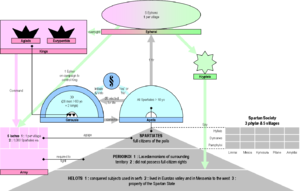
Gerousia
Encyclopedia

Sparta
Sparta or Lacedaemon, was a prominent city-state in ancient Greece, situated on the banks of the River Eurotas in Laconia, in south-eastern Peloponnese. It emerged as a political entity around the 10th century BC, when the invading Dorians subjugated the local, non-Dorian population. From c...
n senate
Senate
A senate is a deliberative assembly, often the upper house or chamber of a legislature or parliament. There have been many such bodies in history, since senate means the assembly of the eldest and wiser members of the society and ruling class...
(council of elders). It was made up of 60 year old Spartan males. It was created by the Spartan lawgiver Lycurgus in the seventh century BC, in his Great Rhetra
Great Rhetra
The Great Rhetra was used in two senses by the classical authors. On the one hand it was the Spartan Constitution, believed to have been formulated and established by the legendary lawgiver, Lycurgus. In the legend Lycurgus forbade any written constitution...
("Great Pronouncement"). According to Lycurgus' biographer Plutarch
Plutarch
Plutarch then named, on his becoming a Roman citizen, Lucius Mestrius Plutarchus , c. 46 – 120 AD, was a Greek historian, biographer, essayist, and Middle Platonist known primarily for his Parallel Lives and Moralia...
, the Gerousia was the first significant constitutional innovation instituted by Lycurgus.
It consisted of 30 members in total, 28 of them 60 years of age or older. Two of these members would be the two Spartan kings, who could be younger than 60. (Sparta was ruled by two hereditary kings, equal in authority.) If one geronte (any Gerousia member other than the kings) died, the people would immediately vote for a new one by shouting for the man they felt was best suited for the job. A group of men in a house would decide which the loudest shout had been without knowing who it had been given for. Of the other 28, usually several would belong to one of the two royal Spartan houses (the Agiad and the Eurypontid). Elected members had to be over the age of 60 and were elected for life. All members would have, in their youth, gone through the Spartan military training program known as the agoge
Agoge
The agōgē was the rigorous education and training regimen mandated for all male Spartan citizens, except for the firstborn son in the ruling houses, Eurypontid and Agiad. The training involved learning stealth, cultivating loyalty to one's group, military training The agōgē (Greek: ἀγωγή in Attic...
. Theoretically, any Spartan citizen of the proper age could stand, but in practice members were selected from the most important aristocratic families. While elections to the Gerousia were technically democratic, contemporary writers (such as the Athenian philosopher Aristotle
Aristotle
Aristotle was a Greek philosopher and polymath, a student of Plato and teacher of Alexander the Great. His writings cover many subjects, including physics, metaphysics, poetry, theater, music, logic, rhetoric, linguistics, politics, government, ethics, biology, and zoology...
) considered the fairness of the elections to be dubious at best.
The Gerousia prepared motions or rhetrai ("rhetra") for the wider citizen assembly, the Apella
Apella
The Apella was the popular deliberative assembly in the Ancient Greek city-state of Sparta, corresponding to the ecclesia in most other Greek states...
, to vote on. The Gerousia could also veto motions passed by the Apella and was consulted by the ephor
Ephor
An ephor was the leader of ancient Sparta and shared power with the Spartan king...
s in matters of interpretation of the law. Additionally, the Gerousia filled the role of a Supreme Court. It could try murder cases — and had the power to condemn, fine, or banish. It could even try the kings for any alleged crime. As a Supreme Court, it had the ultimate say as to what was or was not lawful. In effect, it was the supreme institution in the Spartan constitution, and could override any decision by any other organ in the Spartan political system.

